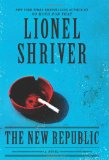 How much of news is manipulated by the media and how would things develop on their own or would they? How much of what drives us is our own insecurities, and how does that impact the world around us—does our popularity ever force us into situations that could otherwise have been avoided? We as humans are always seeking someone to worship and emulate; what does our need for a hero do to the one put on a pedestal? If terrorists didn’t exist, would we be obliged to invent them? The New Republic
How much of news is manipulated by the media and how would things develop on their own or would they? How much of what drives us is our own insecurities, and how does that impact the world around us—does our popularity ever force us into situations that could otherwise have been avoided? We as humans are always seeking someone to worship and emulate; what does our need for a hero do to the one put on a pedestal? If terrorists didn’t exist, would we be obliged to invent them? The New Republic is a satirical story of journalists and journalism, and their love/hate relationship with the terrorists they cover. Even more, it’s a study of how much of what we believe to be true may or may not be invented, a darkly comic novel, full of puns, that looks deep into the human psyche and isn’t overly thrilled with what it finds there.
Edgar Kellogg used to be fat, and he’s never gotten over it. It drives him—this desire to be desired, to be popular, to be accepted—to the point where he automatically rejects people before they have the chance to reject him. Although he became a successful lawyer, he, like Groucho Marx, doesn’t want to be part of a profession that would have him as a member, so in his mid-30s he decides to become a journalist like his high-school idol did, and manages to get hired as a stringer for the New Republic, the newspaper where that former friend works.
He gets sent to Barba, a fictional beard-shaped peninsula jutting off the coast of Portugal, where the larger-than-life journalist Barrington Owen Saddler has gone missing. Edgar moves into his house, drives his car, eats his food, falls in love with his lover, and tries to determine the code on the floppy disks left behind. Barba is truly a barbaric place, (one of the joys of this book is its fun with names and acronyms, like how Barba means beard and also references barbarian) a scrubby wasteland with blistering winds, no culture to speak of, and whose only produce is a bitter, sour hairy pear, a fruit used to make the local beer a “Choque” to the tongue. (that’s the brand name of the beer. The names in this book are full of puns, most of them delightful) The reason for the gathering of the journalists is the activity of the “The Daring Soldiers of Barba”–Os Soldados Ousados de Barba–which is, naturally, abbreviated to SOB. They are supposedly demanding their freedom from Portugal and fighting immigration from Muslim North Africa, although both concepts garner only a low level of support from the general populace. Unique among freedom-fighters, they have never set off a bomb on their own soil; in fact, they are only a voice on the phone with their special code phrase, taking responsibilities for plane crashes and subway bombings around the globe.
I don’t want to give away the central premise of this clever novel, which I ought to have seen coming but in my naivete, didn’t, so I’m only telling you the basic premise, and you’ll have to read the rest yourself. This is a book for those who like satire and who are interested in international journalism. The New Republic is a funny novel with an engrossing story, but it wrestles with all sorts of deeper questions. It doesn’t exactly offer answers, but that’s not the point—sometimes simply asking is enough.
Elizabeth does like satire and spends way too much of her time reading articles written by far-flung correspondents. Learn more at her blog Planet Nomad.
I’ve recently seen several items in the news on a topic about which I am deeply educated. I am shocked at the misconceptions repeated in the articles and the inaccuracies in the reporting. This sounds like an interesting story, touching on those issues.
Plus, what’s not to like about puns? I love them.
Barb, it really was interesting and well done. I hadn’t read this author before, but apparently she wrote this book before 9-11 but sat on it for 10 years because of the sensitivity of the topic. I think you might enjoy it.
Thanks. I think I’m going to look for it. My husband has an obsession with the media and how it goes for headlines rather than “Truth with a capital T” (as he says). We would probably both enjoy it.